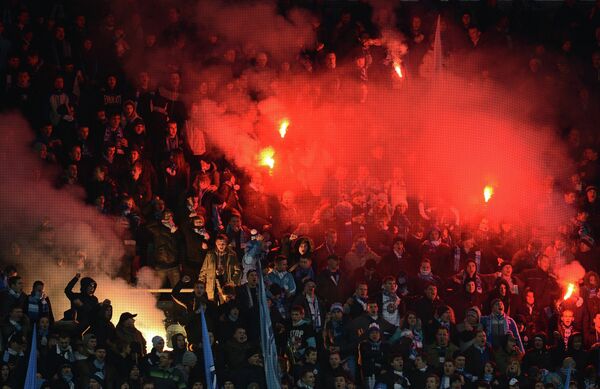MOSCOW, April 9 (R-Sport) – An anti-hooliganism bill designed to ensure public safety at Russian sporting events by banning violent or abusive fans for up to one year was adopted by the State Duma on Tuesday.
The bill, which was introduced last November, passed through its first reading in the lower house of parliament with 226 votes and one abstention. The bill now goes to vote in the Federation Council, parliament’s upper house, and, if passed, would go into force 180 days after it’s signed off by President Vladimir Putin.
According to the proposed legislation, violent fans would receive a one-time fine of $32 and suspension of one to six months. If the fan's behavior led to the disruption of play, the penalty would increase to $64 and could include up to 15 days in jail along with a one-year suspension. Ignoring the ban would lead to fines of up to $160 or 15 days in jail.
"From the point of view of the fans, we were afraid that (the bill) would be draconian, but those moves are not present," All-Russia Fans' Union president Alexander Shprygin told R-Sport. "Very reasonable terms have been accepted."
Honorary Russian Football Union president Vyacheslav Koloskov also applauded legislators, but expressed doubts over how easily the proposed law could be put into practice.
"From to implementing the idea, there's a long, long way to go," he told R-Sport. "How long this takes depends on the coordinated work of all organizations involved in the competitions."
Earlier Tuesday, deputy speaker of the lower house and Olympic Committee chief Alexander Zhukov said the real aim of the bill is to usher in family-friendly atmosphere common at English sports venues. Mass arrests of unruly fans are common at Russian football games, and the issue was cast into the spotlight in November when a game between Zenit St. Petersburg and Dynamo Moscow was abandoned after a firework thrown from the stands injured a player.
It was one of 14,000 offenses committed at Russian sporting events over the last three years, according to deputy sports minister Natalia Parshikova.
Many Russian football fans, including Spartak Moscow's vast fan club, are unhappy about a provision in the proposed law that would force anyone buying tickets to a sports event to present ID at point of sale, a measure already set to be implemented voluntarily by the Russian Premier League next season.
The proposed ban is far shorter than those in other countries, such as Britain, where three-year bans from football matches are the norm and 10-year sanctions can be imposed.

